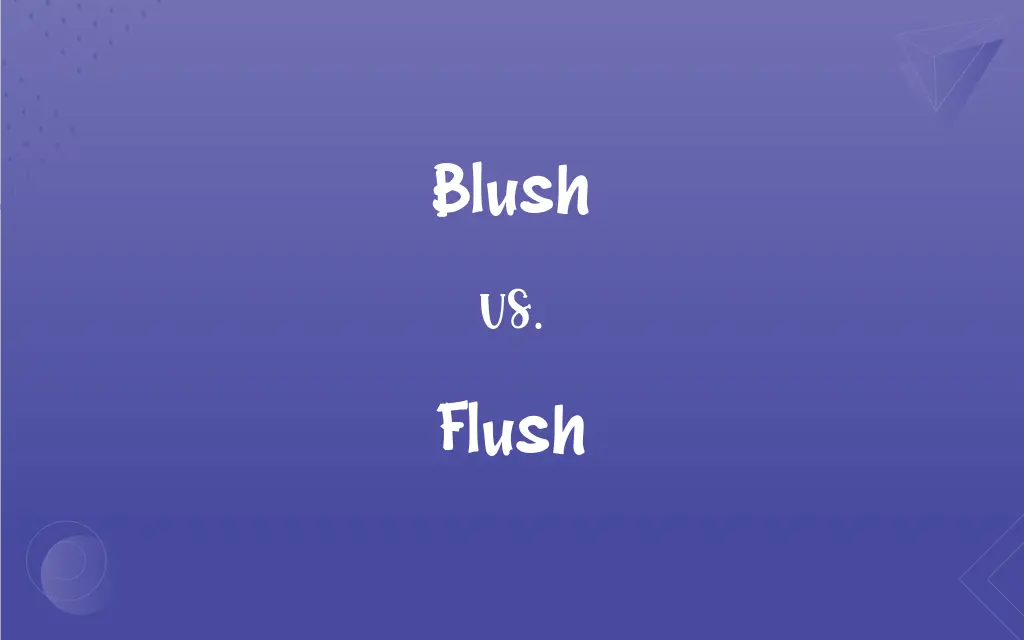Blush vs. Flush: What's the Difference?
Edited by Janet White || By Harlon Moss || Updated on November 10, 2023
Blush is to become red in the face from embarrassment, while flush is a reddening of the skin from a rush of blood, possibly due to heat, illness, or emotion.

Key Differences
Blush refers to the involuntary reddening of the face, typically triggered by emotions such as embarrassment, shyness, or modesty. It is a mild response and usually is localized to the cheeks. Blushing is often seen as a social response and can be a non-verbal way of communicating feelings.
Flush is a broader term that can refer to a redness spreading across any part of the skin, often associated with a variety of causes such as fever, inflammation, or physical exertion. A flush is usually more intense and widespread than a blush and can affect not just the face but also other parts of the body.
A blush is generally associated with a psychological trigger and is considered a normal and common response to certain social situations. It's typically short-lived and can be perceived as a sign of humility or a non-threatening social cue, often eliciting empathy from others.
Conversely, a flush might not have psychological origins at all; it can be a sign of a physical reaction, such as the body’s effort to cool down after exercise or an allergic reaction. Flushing as a physiological response can signal a change in health status and might require medical attention if it's not due to an obvious, harmless cause.
While both blush and flush involve reddening of the skin, blushing is usually a facial response tied to emotional states, and flushing can occur in various body parts and can result from physical conditions as well as emotional states.
ADVERTISEMENT
Comparison Chart
Trigger
Emotional (e.g., embarrassment)
Emotional or physical (e.g., fever, exercise)
Area Affected
Mostly cheeks
Can be face or body
Intensity
Usually mild
Can range from mild to intense
Duration
Short-lived
Can be short or prolonged
Social Perception
Often seen as endearing
Can indicate discomfort or health issues
ADVERTISEMENT
Blush and Flush Definitions
Blush
To turn red in the face from modesty or shame.
She couldn't help but blush when her crush complimented her.
Flush
To cleanse by causing a rapid flow of water.
She hit the lever to flush the toilet.
Blush
To feel embarrassed or ashamed.
He blushed at the thought of his earlier mistake.
Flush
To be in abundance or plentiful.
The garden was flush with flowers.
Blush
A reddish color typically applied to the cheeks.
She applied a pink blush to give her cheeks a rosy color.
Flush
To turn red, especially from heat, illness, or emotion.
His face was flush with fever.
Blush
A soft glow of light.
The evening sky took on a blush as the sun set.
Flush
To drive out of hiding.
The hunters used dogs to flush the birds from the bushes.
Blush
To become red in the face, especially from modesty, embarrassment, or shame; flush.
Flush
To fill or flood with water.
Heavy rains flushed the gutters.
Blush
To become red or rosy.
Flush
To turn red, as from fever, embarrassment, or strong emotion; blush.
Flush
To glow, especially with a reddish color
The sky flushed pink at dawn.
FAQs
Can you flush with anger?
Yes, people can flush with anger, where their face or body turns red due to the emotion.
Is blushing a voluntary reaction?
Blushing is an involuntary reaction that is not under conscious control.
What is a blush in cosmetics?
In cosmetics, blush is a colored product applied to the cheeks to simulate a natural reddening.
What does a flush in poker mean?
A flush in poker is a hand consisting of five cards all of the same suit.
Is blushing related to social anxiety?
Blushing can be related to social anxiety, where it's a common physical response to social stress.
How do you stop blushing?
Stopping blushing isn't easy since it's involuntary, but relaxation techniques and building confidence can help reduce its frequency.
Can blushing be a symptom of a condition?
Blushing is generally normal, but excessive blushing can sometimes be a symptom of conditions like social anxiety.
Can medications cause flushing?
Certain medications can cause flushing as a side effect.
Can a fever cause flushing?
Yes, a fever can cause widespread flushing as the body tries to regulate its temperature.
What might cause someone to flush other than embarrassment?
Someone might flush due to a range of causes, including temperature changes, alcohol consumption, or medical conditions.
Does blushing occur due to attraction?
Yes, blushing can occur due to attraction or romantic feelings.
Are blush and flush synonyms?
Blush and flush are not exact synonyms and are used in different contexts.
Is blushing a universal human response?
Blushing is a common human response but can vary in frequency and intensity among individuals.
Is flushing a sign of high blood pressure?
Flushing can be associated with high blood pressure, though not exclusively.
What does "flushed with success" mean?
"Flushed with success" means feeling excited and confident due to successful achievements.
Can you blush in the dark?
While you can blush in the dark, it may not be visible to others due to the lack of light.
Can anxiety cause flushing?
Anxiety can cause flushing as part of the body's fight-or-flight response.
What does "flush out" mean?
"Flush out" can mean to drive something from its hiding place or to cleanse something by flushing.
Can exercise induce flushing?
Yes, exercise can induce flushing due to increased blood flow and temperature.
Is blushing the same as turning pale?
No, blushing is the reddening of the face, while turning pale is the loss of color.
About Author
Written by
Harlon MossHarlon is a seasoned quality moderator and accomplished content writer for Difference Wiki. An alumnus of the prestigious University of California, he earned his degree in Computer Science. Leveraging his academic background, Harlon brings a meticulous and informed perspective to his work, ensuring content accuracy and excellence.
Edited by
Janet WhiteJanet White has been an esteemed writer and blogger for Difference Wiki. Holding a Master's degree in Science and Medical Journalism from the prestigious Boston University, she has consistently demonstrated her expertise and passion for her field. When she's not immersed in her work, Janet relishes her time exercising, delving into a good book, and cherishing moments with friends and family.































































